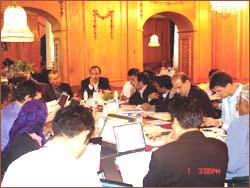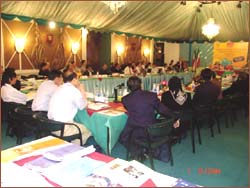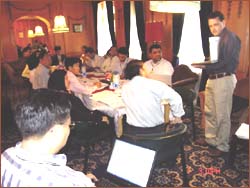Ramsar, Islamic Republic of Iran, 27–30 September 2005
Rohana P. Subasinghe1
The Asia-Pacific Regional Aquaculture Review Workshop was held in Ramsar, Islamic Republic of Iran on 27–30 September 2005. The workshop, organised and conducted in collaboration with the Network of Aquaculture Centres in Asia-Pacific (NACA) and hosted by the Iranian Fisheries Organization (IFO or Shilat), was attended by technical experts from a number of FAO/NACA member countries as well as representatives of a number of technical organizations such as South Pacific Commission (SPC) and the South East Asian Fisheries Development Centre (SEAFDEC). The workshop reviewed the draft Asia-Pacific Regional Aquaculture Development Review and provided necessary clarification/feedback and amendments. In addition, the workshop focussed strongly on the aspect of future trends in aquaculture for the region and some of the forthcoming needs to support or address these emerging issues. The workshop was chaired by the Director of Shilat, Mr Ebrahim Maygoli.
Several major trends in aquaculture development in Asia-Pacific were observed and identified during the workshop. It was apparent from the discussions that aquaculture will continue to be intensified instead of expanding due to various limiting factors, although in some places, a reverse trend may happen. The sector will also continue to diversify in terms of species as well as systems practiced, which will therefore call for more responsible use of species and other inputs. It is also clear that, at least for the regionally or internationally traded commodities, the driving forces will include markets, trade and consumption which will greatly influence production and producers. As aquaculture continues to intensify and diversify, there will be need for stringent regulations, better law enforcement, and improved governance at national levels. All these will compel the sector towards better management (at all levels) in order to keep up with the current performance of the sector.
The participants at the workshop comprised of representatives of a selection of FAO/NACA member countries (Cambodia, India, Indonesia, Malaysia, Myanmar, Nepal, Pakistan, Philippines, Sri Lanka, Thailand, and Viet Nam). The workshop process was based around a number of plenary presentations and a series of working group discussions that were aimed at validation of the information, addition of missing points and the elaboration of future trends (in effect the prospective analysis). The outcome of the workshop will be published as an FAO Fisheries Circular and all the seven regional reviews (Asia-Pacific, Africa, Latin-America, North America, Western Europe, Eastern Europe, and the Near East) will be synthesised into a single Global Aquaculture Development Status and Trends Review and published in due course.
1 Rohana P. Subasinghe
Inland Water Resources and Aquaculture Service,
FAO Fisheries Department, Rome
 |  |  |